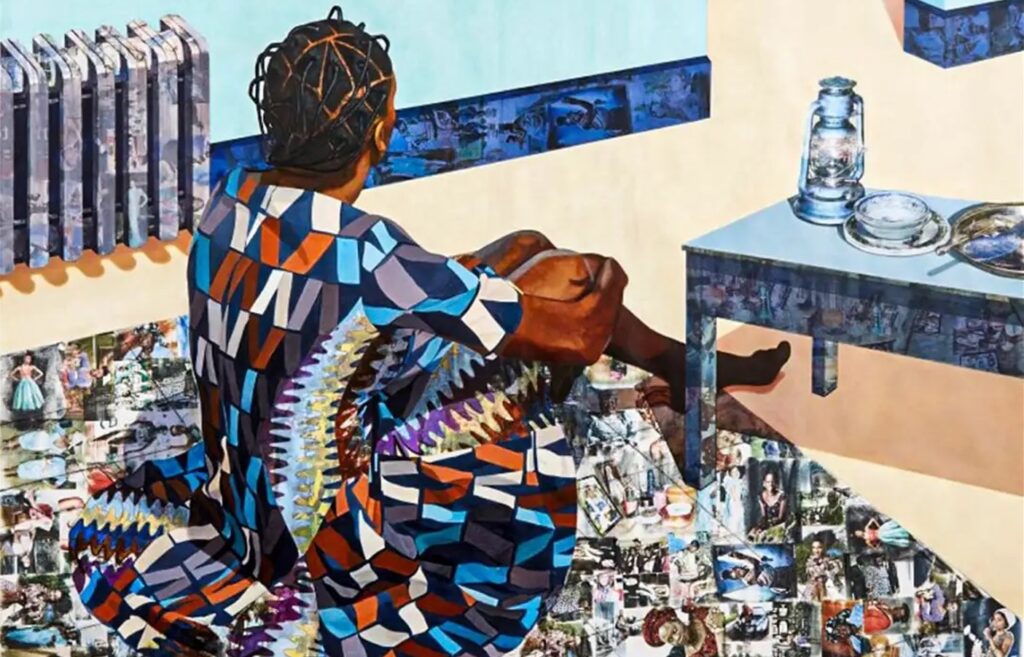The Yale Center for British Art, New Haven, United States
22 Sep 2022 - 22 Jan 2023

Njideka Akunyili Crosby, “The Beautyful Ones Are Not Yet Born” Might Not Hold True For Much Longer, 2013. Acrylic and photographic transfers on paper, 64×82 7/8 in. (162.6×210.5cm). Nasher Museum of Art at Duke University, Durham, North Carolina, gift of Marjorie and Michael Levine © Njideka Akunyili Crosby, courtesy of the artist, Victoria Miro, and David Zwirner
The Yale Center for British Art (YCBA) presents a selection of six works by Njideka Akunyili Crosby (b. 1983), Yale MFA 2011, from Septem-ber 22, 2022 through January 22, 2023. The exhibition will travel to the Huntington Library, Art Museum, and Botanical Gardens in San Marino, California, where it will go on view in February 2023.
This is the third and final exhibition in a series curated by the Pulitzer Prize–winning author Hilton Als in collaboration with the YCBA and each artist. Previous exhibitions fea-tured works by Lynette Yiadom-Boakye (2019) and Celia Paul (2018). Als’s essays about the series will be published by the YCBA and Yale University Press in fall 2023.
Als and Akunyili Crosby selected works from The Beautyful Ones, the artist’s ongoing series of intimate portraits of Nigerian children, including members of her own family. The title references a classic 1968 novel, The Beautyful Ones Are Not Yet Born, by Ghanaian author Ayi Kwei Armah. Published in a year of worldwide civic and social unrest, Armah’s book comments on the challenges of revolution, addresses the unfulfilled political prom-ises of the postcolonial African nation-state, and looks ahead from a place of lost hope. The YCBA exhibition will also feature the painting « The Beautyful Ones Are Not Yet Born » Might Not Hold True For Much Longer (2013), a precursor to the series that anticipates the arrival of a new generation of children free from the corruption and self-interest depicted in Armah’s novel.
Using acrylic paint, textiles, collage, and photocopy solvent transfers, the artist creates a substrate of images culled from Nigerian pop culture magazines, commemorative printed fabrics, personal family albums, and her own photography. These fragments, which can include fashion models, dictators, or family portraits, are carefully pieced together in layers rich with Nigerian and American culture and politics.
“Akunyili Crosby’s paintings present a world that is built out of layers, and deeply commit-ted to the depth to be found on the surfaces that make up intimate and private spaces, including the body,” Als noted. “Her canvases are alive with, and to, her understanding of her various subjects’ layered, complex, and vulnerable lives.”
History, philosophy, and fantasy permeate the walls of Akunyili Crosby’s quiet domiciles. Furnished with vintage decor and analog electronics, the interiors evoke her own 1980s-era youth, suggesting that childhood is as much a construct of memory and culture as it is a temporal stage of existence. Everyday scenes and spaces become sites of dislocation and harmony, vulnerability and hope, as Akunyili Crosby delves into the diasporic experience to explore what it means to belong or to be an outsider.